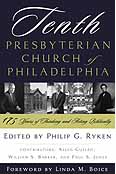
Philip G. Ryken, Ed.
Reviewed by: D. G. Hart
Tenth Presbyterian Church of Philadelphia: 175 Years of Thinking and Acting Biblically. Edited by Philip G. Ryken. Published by P&R Publishing, 2004. 238 pages, hardback, list price $24.99. Reviewed by D. G. Hart, a member of Calvary OPC in Glenside. Pa.
When Westminster Seminary was founded in 1929, it was initially located just around the corner from Tenth Presbyterian Church. Yet, despite their proximity to each other and their similar opposition to the spread of theological liberalism in the Presbyterian Church in the U.S.A. (PCUSA), the Presbyterians who worshiped at Tenth and those at Westminster who led in the formation of the OPC traveled along fairly separate ecclesiastical paths.
Tenth Presbyterian Church of Philadelphia provides a valuable perspective on the factors that led some conservatives to remain in a denomination that the OPC's founders could not tolerate. Of course, the book deals with much more than that. It is a well-written, informative, and relatively short history of a congregation that through the herculean efforts of nationally prominent preachers is one of the few historic evangelical churches remaining in America's oldest cities.
The book combines the work of three authors. Allen Guelzo, well before he became famous as a biographer of Abraham Lincoln, wrote a history of Tenth for its 150th anniversary in 1979. That material, slightly revised, forms the substance of this book. William S. Barker, former academic dean and professor of church history at Westminster, has added a chapter on James Montgomery Boice, who pastored Tenth from 1968 until his death in 2000. Philip Graham Ryken, Tenth's current senior pastor, concludes the book with a chapter on the church's vision for ministry.
Founded in 1829, Tenth Church benefited from the capable ministry of Henry Augustus Boardman, whose pastorate extended from 1833 to 1876. Declining membership after the Civil War, owing in part to Philadelphia's changing demographics, forced Tenth to merge in 1893 with the West Spruce Street congregation. This brought the congregation to its current location and provided the West Spruce congregation with a new name. Into the twentieth century, Tenth would continue to experience difficulties as an urban church. When J. Gresham Machen preached there in the fall of 1924, he wrote to his mother that Tenth's structure seemed "run down" and that the church had no evening service. Donald Grey Barnhouse, who came a couple of years later and stayed until 1960, breathed vigor into the congregation. But his outside activities as radio broadcaster, magazine editor, and conference speaker also alienated some. (One of the virtues of this book is that, despite its celebrative function, it yields a candid account of Tenth's weaknesses, as well as its strengths.) Barnhouse's outside interests may have upset some, but as the ministry of Boice would suggest, a downtown congregation faces difficulties that may require pastors with special abilities to do more than simply pastor the local flock. Boice continued many of the activities that Barnhouse started.
As much as the history of Tenth Church says about urban churches, it reveals even more about American Presbyterianism. Tenth has weathered the two great storms of Presbyterian strife, first the Old School - New School division and then the modernist - fundamentalist controversy.
This book offers a glimpse of how these conflicts played out at the congregational level. Even more important is what the book reveals about those Presbyterians who would not leave the mainline church with J. Gresham Machen to form the OPC. When Tenth finally left the PCUSA, it considered joining the OPC, but in 1981 decided to unite with the Reformed Presbyterian Church, Evangelical Synod, which two years later merged into the Presbyterian Church in America. Some Orthodox Presbyterians will take issue with the reasons that led to these decisions, but the opportunity to consider those arguments afresh and see their results makes this book much more than simply a commemorative history of a notable Philadelphia Presbyterian congregation.
December 14, 2025
December 07, 2025
November 30, 2025
November 23, 2025
November 16, 2025
November 09, 2025
November 02, 2025
© 2025 The Orthodox Presbyterian Church